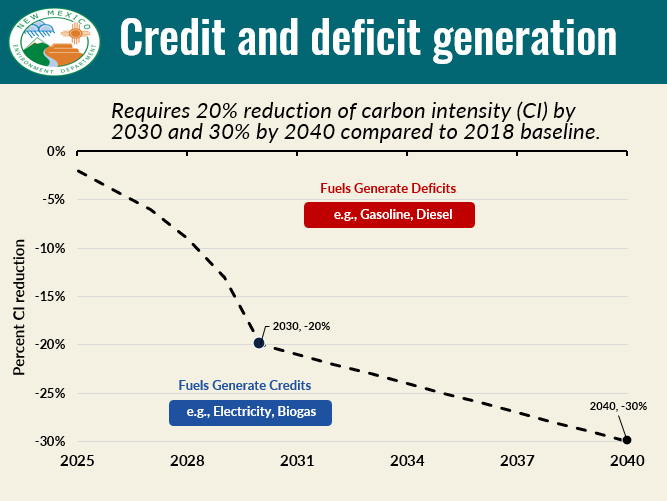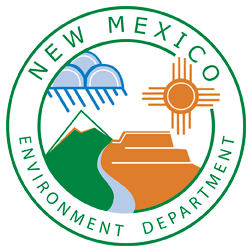CTFP Rulemaking Updates
NMED has submitted Petition to the Environmental Improvement Board
On Friday, May 16, 2025, NMED’s Climate Change Bureau submitted a petition to the state’s Environmental Improvement Board (EIB) to consider adopting the proposed new rule, 20.2.92 NMAC. Next, the EIB will set a date for a hearing to consider the proposed rule.
A copy of the petition, statement of reasons, and draft proposed rule is available here.
Since the codification of New Mexico’s Clean Transportation Fuel Program (CTFP) in the Environmental Improvement Act in 2024 [New Mexico Statutes Annotated (NMSA) 1978, Sections 74-1-3, 7(A)(15), 8(A)(15), and 18], the NMED’s Climate Change Bureau has embarked on a robust process that led to this formal petition.
Since May 2024, the NMED’s Climate Change Bureau has: (a) facilitated advisory committee meetings and obtained input from the committee and the public on the CTFP; (b) released and solicited input from the public and interested parties on a discussion draft rule; (c) held in-person and virtual public meetings on the CTFP (see Opportunities for Public Engagement section below for additional information and documents); and (d) responded to and met with parties requesting specific one-on-one discussions.
During the above process, commenters and interested parties from various sectors requested that the NMED’s Climate Change Bureau publish additional information to inform the public’s understanding of the CTFP’s impact on transportation fuels consumed in New Mexico. To further this understanding and facilitate public engagement with the rulemaking process, the NMED’s Climate Change Bureau is providing the following updated information:
- Updated Rule Tables 1-5 (corrected version uploaded 2025-03-19 at 9:15am MT)
- Table 1 – New Mexico Clean Transportation Fuel Standard for Gasoline and Gasoline Substitutes
- Table 2 – New Mexico Clean Transportation Fuel Standard for Diesel and Diesel Substitutes
- Table 3 – New Mexico Clean Transportation Fuel Standard for Alternative Jet Fuel Based on the Carbon Intensity of Conventional Jet Fuel
- Table 4 – New Mexico Statewide Carbon Intensity Lookup Table
- Table 5 – New Mexico Temporary Carbon Intensities
- Workbooks from the Argonne National Laboratory’s Greenhouse Gases, Regulated Emissions, and Energy Use in Transportation, 2023 Research and Development version (R&D GREET 2023) that provide updated information on the 2018 carbon intensity (CI) baseline (for Tables 1-3) and the CI lookup and temporary values (for Tables 4-5). R&D GREET is a lifecycle assessment model that systematically examines the energy and environmental effects of a wide variety of transportation fuels and technologies across major sectors and energy systems (Wang et al. 2023).
- Equations from the rule shown in mathematical formatting rather than as word-based in the CTFP rule as New Mexico State Records Center and Archives requires.
- CTFP Fuel Volume and Credit Market Projections (released January 31 and now with sources and assumptions added).
Please note that the information contained in the documents shared here is preliminary and may be modified as research, modelling, public engagement, and input from Tribes, Pueblos, and Nations and interested parties progresses. This material is intended for descriptive and educational purposes and is not intended to convey final information, language, or findings that NMED will submit in the rulemaking process. NMED retains the right to adjust and update this content in future versions.
Public Meetings
NMED hosted an in-person public meeting on Monday, Jan. 6, from 4:30-6:30 p.m. at the Albuquerque International Public Library and a virtual meeting from 12-2 p.m. on Thursday, Jan. 9. The presentation slide deck for Jan 6 is HERE, and the slide deck for Jan. 9 is HERE. The recording of the Jan. 9 virtual public meeting is HERE.
Discussion Draft Rule Input
NMED invited the public to provide input on the discussion draft rule (20.2.92 NMAC) of the Clean Transportation Fuel Program from December 20, 2024 at 5 pm, through January 17, 2025, at 5 pm. The public input NMED received is available below.
Public Input on CTFP Discussion Draft Rule: https://service.web.env.nm.gov/urls/FQMuNeqd
Creating a Clean Transportation Fuel Program for New Mexico
With the passage of House Bill 41 in March 2024, the State of New Mexico became the fourth state in the U.S. to authorize a Clean Transportation Fuel Program (CTFP).
New Mexico’s CTFP (1) establishes a statewide carbon intensity standard for transportation fuels and (2) creates a marketplace to buy, trade, and sell credits based on whether fuels are above or below that standard.
Companies producing or importing fuels above the carbon intensity standard — an objective way of measuring carbon throughout the lifecycle of a fuel — would have to buy credits in order to sell those higher carbon fuels in New Mexico. Companies producing or importing fuels with carbon intensities below the standard would generate credits for their lower carbon fuels to sell.
The ultimate goal of the marketplace is to reduce the overall pollution from transportation fuels used in New Mexico and incentivizing fuel producers and importers to decline their carbon footprint in order to avoid having to purchase costly credits. Importantly, the CTFP is not the same as a cap-and-invest program.

New Mexico’s CTFP authorizing law establishes the framework for the CTFP, and the proposed new rule, 20.2.92 NMAC, will govern how the CTFP operates. The law requires the EIB to enact regulations to initiate the CTFP no later than July 1, 2026.
CTFP Advisory Committee
In furtherance of creating the most beneficial CTFP for New Mexico, NMSA 1978, Section 74-1-18(B) directed the Environment Secretary to convene a CTFP Advisory Committee to provide technical input to inform development of CTFP rules. The Environment Secretary convened the CTFP Advisory Committee from June 21 to July 26, 2024. Announcements, agendas, and minutes were posted and published as required by the Open Meetings Act. Announcements, notices, agendas, minutes, recordings, copies of presentations, written public comments, and procedures from the CTFP Advisory Committee meetings are below, as are the CTFP Advisory Committee’s Technical Report and public comments on that report.
- New Mexico CTFS Advisory Committee: Technical Report (final; adopted and issued on July 26, 2024): https://service.web.env.nm.gov/urls/jeDOxDem
- Notice of Correction: https://service.web.env.nm.gov/urls/YuAIEqEG
- Notice of Correction: https://service.web.env.nm.gov/urls/YuAIEqEG
- Public Comments: https://service.web.env.nm.gov/urls/nSXXMtpl
- The public had an opportunity to provide written comments to NMED on the CTFS Advisory Committee: Technical Report from 5:00 PM MT Friday, July 26, 2024, through 5:00 PM MT Friday, August 2, 2024.
June 21, 2024, CTFP Advisory Committee Meeting Information:
Meeting Announcement:
- English: https://service.web.env.nm.gov/urls/SSBcMegW
- Español: https://service.web.env.nm.gov/urls/FQwtNJPo
Meeting Agenda:
- English: https://service.web.env.nm.gov/urls/GYxRsoZO
- Español: https://service.web.env.nm.gov/urls/bvRqpBNr
Meeting Minutes, Recording, and Copies of Presentations:
- Minutes: https://service.web.env.nm.gov/urls/YhAfnpCE
- Recording: https://youtu.be/hb-wlHnyxQc
- Presentations: https://service.web.env.nm.gov/urls/dtQjbPmN
June 28, 2024, CTFP Advisory Committee Meeting Information:
Meeting Announcement:
- English: https://service.web.env.nm.gov/urls/KUJzJzFX
- Español: https://service.web.env.nm.gov/urls/IvQUByRA
Meeting Agenda:
- English: https://service.web.env.nm.gov/urls/zDhPPoeM
- Español: https://service.web.env.nm.gov/urls/vHFfujZu
Meeting Minutes, Recording, and Copies of Presentations:
- Minutes: https://service.web.env.nm.gov/urls/OZfBIAEE
- Notice of Correction: https://service.web.env.nm.gov/urls/YuAIEqEG
- Recording: https://www.youtube.com/watch?v=IYyobTA2-OU
- Presentations: https://service.web.env.nm.gov/urls/WTVWDuFM
July 12, 2024, CTFP Advisory Committee Meeting Information:
Meeting Announcement:
- English: https://service.web.env.nm.gov/urls/eEtNsnPD
- Español: https://service.web.env.nm.gov/urls/iECcCoDB
Meeting Agenda:
- English: https://service.web.env.nm.gov/urls/HOyhaNYt
- Español: https://service.web.env.nm.gov/urls/MTMxmIHn
Meeting Minutes, Recording, and Copies of Presentations:
- Minutes: https://service.web.env.nm.gov/urls/JxnBjlFG
- Notice of Correction: https://service.web.env.nm.gov/urls/YuAIEqEG
- Recording: https://www.youtube.com/watch?v=PhyFe2C6JcE
- Presentations: https://service.web.env.nm.gov/urls/vnfinMCR
July 26, 2024, CTFP Advisory Committee Meeting Information:
Meeting Announcement:
- English: https://service.web.env.nm.gov/urls/jVfnzakX
- Español: https://service.web.env.nm.gov/urls/PtWQbEgb
Meeting Agenda:
- English: https://service.web.env.nm.gov/urls/xopWHZBu
- Español: https://service.web.env.nm.gov/urls/nqEkDznQ
Meeting Minutes, Recording, Copies of Presentations:
- Minutes (draft): https://service.web.env.nm.gov/urls/WKtEPUjZ
- Recording: https://www.youtube.com/watch?v=P35w6n88ifw
- Presentations: Not applicable.
The CTFP Advisory Committee adopted its 2024 Open Meeting Compliance Procedures (final; adopted and issued on June 28, 2024), available here: https://service.web.env.nm.gov/urls/hxZbZnmp.
With the issuance of the CTFP Advisory Committee Technical Report, the CTFP Advisory Committee has now been dissolved. However, NMED anticipates convening additional advisory committees in the future for periodic review of the CTFP rule per Section 74-1-18.
CTFS Advisory Committee Members:
| Name: | Affiliation: |
| Alaric Babej | Public Service Company of New Mexico (PNM) |
| Amy Brown | Adelante Consulting, Inc. |
| Anthony Willingham | Electrify America, LLC |
| Brian Bartlett | Valero Energy |
| Cara Lynch | Coalition for Clean Affordable Energy |
| Cory-Ann Wind | Clean Fuels Alliance America |
| Dalva Moellenberg | New Mexico Mining Association |
| Daniel Klein | Twenty-First Strategies an Libertad Power |
| Eduardo Barrientos | ExxonMobil |
| Ethan Epstein | New Mexico Tax Credit Alliance |
| Evan Rosenberg | SRECTrade |
| Gabriel Pacyniak | UNM School of Law Clinic |
| Graham Noyes | Sustainable Aviation Fuel Producer Group |
| Jane Sadler | RMI |
| Jed Smith | Rio Valley Biofuels, LLC |
| Jessica Gregg | Carbon America |
| Joseph (Joe) Sorena | Chevron Products Company |
| Kari Buttenhoff | Christianson PLLP |
| Karl Feldman | Individual |
| Lloyd Funk | Phillips 66 |
| Luis Reyes | Kit Carson Electric Cooperative |
| Matthew Weyer | Taos Ski Valley |
| Michael Teague | ONEOK |
| Robert Hagevoort | NMSU Dairy Extension |
| Sam Wade | Coalition for Renewable Natural Gas |
| Teresa Sosa | El Paso Electric Company |
| Tiffany Wallace Polak | Occidental Petroleum |
| Todd Trauman | Energy Mission Control, Inc. dba FuSE |
| Tom Dollmeyer | Individual |
| Travis Madsen | Southwest Energy Efficiency Project |
| Viswanath Krishnamoorthy | Qynergy Corporation |
Opportunities for Public Engagement
Anyone or any entity interested in participating in development of the CTFP rule may do so in multiple ways:
- Once the Environmental Improvement Board (EIB) has agreed to consider the proposed rule:
- Provide comments to the EIB through a comment portal after NMED informs the public when it opens.
- Appear at the rulemaking hearing to address the EIB directly in person on the proposed rule as part of that proceeding.
- Request a meeting with the NMED rulemaking team by submitting a meeting request form.
- If you use this option and don’t hear back within three business days, please reach out to the NMED rulemaking team at cleanfuel.standard@env.nm.gov.
- The public was invited to provide input to the department on the discussion draft rule (20.2.92 NMAC) of the Clean Transportation Fuel Program from December 20, 2024, at 5 pm, through January 17, 2025, at 5 pm. The public input NMED received is available below.
- Public Input on CTFP Discussion Draft Rule: https://service.web.env.nm.gov/urls/FQMuNeqd
- NMED hosted an in-person public meeting on Monday, Jan. 6, from 4:30-6:30 p.m. at the Albuquerque International Public Library and a virtual meeting from 12-2 p.m. on Thursday, Jan. 9. The presentation slide deck for Jan 6 is HERE, and the slide deck for Jan. 9 is HERE. The recording of the Jan. 9 virtual public meeting is HERE.
The best way to stay informed of updates is to subscribe to NMED’s Climate Change Bureau’s listserv.
Public Involvement Plan for Clean Transportation Fuel Program Rule
CTFP Virtual Public Meeting Jan. 9
What is the process for the rulemaking?
The process starts by NMED submitting a proposed rule to the EIB and requesting the EIB hold a rulemaking hearing to determine if the rule should be finalized. At the time EIB grants NMED’s hearing request, CCB will issue notices, including identifying the time and place of the hearing, hold public meetings and facilitate public participation opportunities, engage with Pueblos, Tribes and Nations on the draft rule, and continue to meet with interested persons and entities on rule language. To meet its notice requirements, CCB will publish all notices on this website, which offers instant Spanish and Vietnamese translation via the dropdown at upper right, in the New Mexico Register, and in at least one newspaper of general circulation — in this case, at least the Albuquerque Journal.
At the rulemaking hearing, NMED and potentially other interested parties will present testimony on the proposed rule to the EIB. All those interested in participating will have a reasonable opportunity to provide comments to EIB at the hearing. The EIB will then deliberate and decide whether to adopt the rule. If the EIB adopts the rule, NMED will file the rule with the New Mexico State Records Center and Archives (SRCA) and the SRCA will publish the rule in the New Mexico Register. The rule becomes effective thirty days after filing with the SRCA, unless a later date is provided in the rule. CCB anticipates the current rulemaking to be one of many rulemakings on the CTFP given its complexity.
How exactly does a CTFS work?
Experience in other areas with a CTFP has shown that it not only decreases harmful emissions but also provides economic growth, jobs, and more fueling options for consumers. Adelante Consulting estimates that hundreds of full-time and construction jobs will result from the clean fuel standards’ implementation. Clean fuels jobs have risen sharply in recent years, with the number of positions nationwide increasing by 16.5% between 2022 and 2023. Furthermore, a CTFP provides drivers in New Mexico with greater fuel choices for their vehicles, which will reduce sole source reliance on traditional fossil fuels and has the potential to reduce all fuel market prices due to increased fuel competition.
Why is this program needed now?
First, investment in clean fuel technologies and energy diversification is increasing across the nation – and business decisions are being made now that will affect clean job opportunities in the state. This program is needed now to ensure those clean jobs and industries select New Mexico for their investments.
Second, the state of New Mexico is on a carbon reduction timeline per Executive Order 2019-03, Addressing Climate Change and Energy Waste Prevention, which directs the state to reduce its greenhouse gas emissions by 45% by 2030 from 2005 levels. The Leap Ahead Analysis Assessment, authored by New Mexico Bureau of Geology & Mineral Resources, the state’s geological survey, points to severe impacts from climate change for our state, including an average temperature increase of 5 to 7 degrees Fahrenheit, decreased water supply, and increased frequency and intensity of wildfires. Meeting this goal is imperative for New Mexico, as it continues to do its part to address the climate crisis.
The CTFP is not a silver bullet for the climate crisis for New Mexico, but as a “comprehensive market-based program that sets emission limits to reduce carbon dioxide, and other greenhouse gas pollution, across New Mexico,” it is one key policy and regulatory strategy identified in the Executive Order to assist in helping us achieve our state goals.
Third, according to New Mexico’s authorizing CTFP law, the initial CTFP must be adopted by the Environmental Improvement Board (EIB) promulgate rules to implement a CTFP no later than July 1, 2026. Thus, NMED is currently working to ensure this timeline is met by presenting the EIB with a petition rule for adoption. See “What is the process for the rulemaking?” above for more information.
How does this program help low-income communities?
Under New Mexico’s CTFP law, a participating utility’s net revenue from the CTFP must support transportation decarbonization projects — with at least fifty percent of such revenues supporting people living in low-income and underserved communities. Combined with other transportation policies, the CTFP can lower air pollution, which often disproportionately impacts people who live in low-income communities.
Will a CTFP raise gasoline prices?
Gasoline and diesel prices change due to several factors, including underlying demand, crude oil prices, distribution and marketing costs, refining costs, and state excise taxes. Research with data from states that have had CTFP-like policies in effect show that the cost of clean fuel credits are not correlated with and have not led to a demonstrable increase in prices at the pump. Many oil and gas producers are already innovating to decrease the carbon intensity of their fuels. The CTFP gives these producers and clean fuel innovators incentives to make the change to cleaner fuels happen faster.
Updated 2025-03-19

